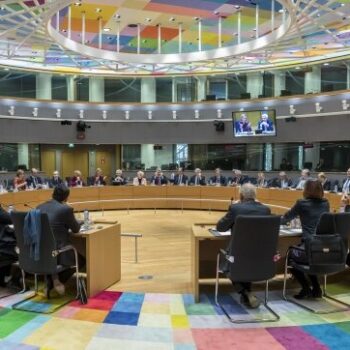This month marks the 20th anniversary of the United Nations Framework Convention on Climate Change (UNFCCC), and yet even 20 years on, despite all its achievements, this institution is still hounded by sceptics from across the globe.
These sceptics aren’t the old school climate deniers, but professional commentators who consistently attempt to undermine the effectiveness of binding international cooperation on climate change.
A recent article in Foreign Policy by David Schorr epitomises this group of professional ‘climate realists’.
It’s summed up with his endorsement of Todd Stern’s remark that “an agreement that is animated by the progressive development of norms and expectations rather than by the hard edge of law, compliance, and penalty has a much better chance of working“.
These climate realists don’t deny that climate change is taking place; they merely claim that the politics are too tough to agree anything with real teeth, and, moreover, that teeth are not required for global decarbonisation.
Whilst they might not deny the existence of human-induced climate change, their solution does deny the severity and immediacy of climate change, wrapped up in a ‘reasonable’ proposition, and is therefore all the more dangerous.
Political will
This isn’t to say that the politics of climate change are easy.
The UNFCCC endeavour is attempting to get 194 countries to transform the global energy system: this is no mean feat. Schorr is right when he says political will is not the problem. It’s the political economy, stupid!
Those tax revenues raised from high carbon sectors, those employed by energy intensive industries, the revolving doors between the fossil fuel industry and our political elite, and to top it all, our savings and pensions invested in the fossil fuel sector.
The high carbon economy is embedded throughout our development models, and this is what hinders our leaders from being bold on climate change.
This is not just a case of political will and moral decency, but about transforming the systems and structures that underpin our economic growth.
Three tests
Schorr concludes that legal force is the wrong litmus test for success in the UNFCCC. But he doesn’t attempt to articulate what the litmus test for the agreement should be.
A more sophisticated line of argument should outline that there are only three litmus tests for assessing the 2015 climate agreement.
First, it needs to send a strong and credible signal to the executive committees of the world’s largest companies, be they multinational conglomerates or state owned enterprises. The message the bosses should hear is that governments are serious about decarbonisation.
This should inform their strategic planning from now until mid-century. We know from experience that the Kyoto Protocol didn’t do enough to affirm this message. It didn’t give a clear, long-term direction of travel: we need something more radical so that decarbonisation is perceived as inevitable.
Secondly, it’s important that the agreement builds confidence among countries regarding their ability to deliver and implement their commitments. Governments should not be able to use the excuse that others are not delivering in order to shirk their own commitments.
Robust transparency and accountability mechanisms will be essential to inspire mutual assurance of actions. These will reinforce and enhance the international rules-based system we already have. Demonstrating intent to abide by such rules protects all those participating.
And finally, the outcome must get a better grip on who is responsible for managing climate risk. At present, the disconnect between mitigation ambition and country planning assumptions for climate impacts is glaring.
Countries are planning for 2C temperature rise – and mitigating for a 4-6 °C world. There is currently no mechanism for marrying these two assumptions, resulting in an asymmetric risk landscape.
Not only would a process that links mitigation to risk levels enable governments and other actors to prepare for the onslaught of climate impacts, but it would also demonstrate the scale and costs of inaction, in turn helping to mobilise ambition.
Steady progress
It is these benchmarks which should be the litmus test for the 2015 agreement. 2015 won’t be a boom or bust scenario.
It will be a turning point, a beginning of the end. An attempt to capture and catalyse ambition. Schorr singles out Copenhagen as a remarkable success, in stark contrast to public perceptions.
Whilst Copenhagen wasn’t an outright failure, in that it captured the politics of the moment, it was only a stepping stone. It did not succeed. Even Shorr admits that Copenhagen allowed countries to stay within their comfort zone.
It did little to challenge the political economy structures which intertwine the corporate incumbents and political elite. Copenhagen was not a credible signal to investors and business – it was confusing signal.
We didn’t witness Exxon, BP, PEMEX, SINOPEC, BMW, BASF and co. sit up and take notice. In part this was due to the levels of ambition on offer, and in part because it raised the question, if governments really were serious, why wouldn’t they bind themselves?
Legally binding is one of a combination of measures governments can undertake to demonstrate political intent to decarbonise.
Soft power
The systematic attempts to undermine the notion and reality of internationally legally binding provisions is never more evident than in the consistent rubbishing of the Kyoto Protocol. The climate realists fail to grasp the subtleties and soft power of international binding agreements.
Whilst the Kyoto Protocol is far from perfect, it did succeed in reducing emissions, not only from those who were party to it, but also from those not covered. For example, China is modelling its decarbonisation pathway upon the European experience.
China has recently launched the first of seven pilot Emissions Trading Schemes, which covers four provinces and cities, about 20% of China’s emissions and 26% of its GDP. In addition, EU standards for appliances, chemical pollution and waste control are increasingly deployed in both advanced and emerging economies.
A recent UN report on international fuel economy standards demonstrated that Europe’s lead on fuel economy standards is setting the global agenda towards convergence by 2020 [1]. And it wasn’t only countries that responded to the threat of binding international agreements: cities and legislatures took up the mantle.
The recent GLOBE Climate Legislation Study [2] highlighted that since 1997 almost 500 national climate laws have been passed in 66 countries.
Where climate realists fall down is that their approach is defeatist and they view success as binary. Unless we capture every greenhouse gas emission in the world, we’ve failed. It’s too difficult, we shouldn’t bother.
But climate change isn’t a zero sum game.
It’s true, dangerous thresholds could be breached if we go beyond 2 degrees. But if we meet 2.2 degrees, it’s still better than business and usual at 4 – 6 degrees.
And why give up before we’ve even begun? For example, it is not considered a failure when the global community agrees a Non-Proliferation Treaty that “only” covers 189 states.
Todd Stern is incorrect: treaties set global norms and attitudes, to address challenging global problems and critically protect those inside from rogue states.
This is not to say that addressing the pace and scale of climate change is irrelevant; but neither should we be defeatist if we capture 90% of what’s required. A sense of agency is essential to address this challenge, not defeatism
Senate influence
Many climate realists hail from the US, and their voices are replicated by the naysayers among the large emitters. Perhaps the geographic concentration stems from the inability of the US to ratify a legally binding agreement, and realists parrot the government line.
But this should have limited bearing upon which direction the rest of the world heads. We shouldn’t let the 66 votes required by the Senate to ratify an international agreement shape the global level of ambition.
We shouldn’t let those 66 votes condemn millions to deeper deprivation and stop employment and prosperity following an alternative model of development. We shouldn’t let a mere 66 votes turn us into defeatists.
Report: US envoy Todd Stern calls for Congress climate truce
Those 66 votes represent an almost impossibly miniscule fraction of the global population.
It will be the overwhelming majority of the world’s countries that will deliver the synchronicity, commitments and deadlines that provide a political focus and mandate for aggregating ambition.
The alternative is unthinkable: a drip feed of insufficient efforts that fail to convince those whose capital allocation decisions shape the global economy that decarbonisation is inescapable.
No single country can manage the risks climate change imposes and exposes it to by itself. It requires global collaboration. But collaboration that demonstrates serious political intent.
Legally binding is one critical element that signals to decision-makers across the real economy that the game is on – and that decarbonisation would be inevitable.
This article was first published by RTCC.
Excellent piece by @LizGallagher of @EthreeG on the dangerous siren voices of "climate realism" http://t.co/vqqWxLF8e2
— Keith Allott (@KeithAllott) March 29, 2014
References
[1] http://www.un.org/esa/dsd/resources/res_pdfs/csd-19/Background-paper3-transport.pdf
[2] http://www.globeinternational.org/studies/legislation/climate
This project action has received funding from the European Commission through a LIFE grant. The content of this section reflects only the author's view. The Commission is not responsible for any use that may be made of the information it contains.



